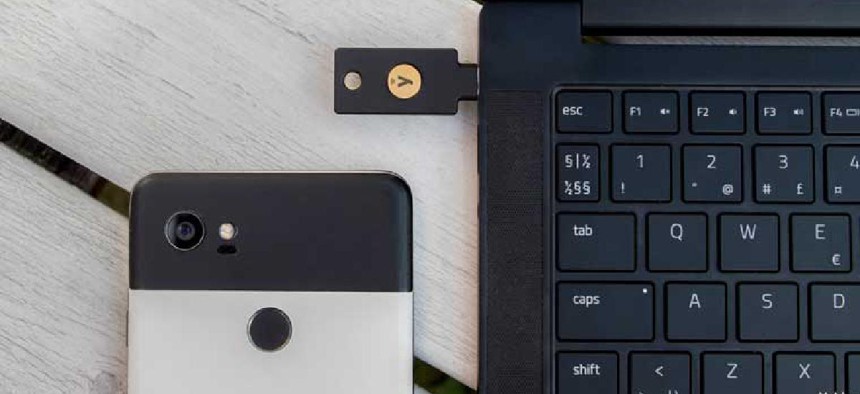Sacramento adopts hardware-based authentication


Connecting state and local government leaders
To fight account-takeover attacks and streamline remote access, city officials issued Yubikeys to make multifactor authentication easy and secure for 500 employees.
About 500 city workers in Sacramento, Calif., are using portable multifactor authentication technology to better protect networks.
As phishing scams and account takeover attempts targeting city workers increased, the IT department set a goal of implementing more restrictive but easy-to-use security measures and landed on multifactor authentication. IT officials tried various approaches: a one-time password that workers got via a phone call when they needed it, SMS messages that provided several-digit codes and mobile authenticators, or apps that provide one-time use codes to access devices or programs.
“All those were really good, but the major challenge that we faced was with a lot of our employees, they don’t receive a city-issued mobile device or receive a stipend, like a tech allowance, so we can’t mandate having these employees use their personal devices to receive just that code,” said Curtis Chiuu, principal systems engineer for the city.
He learned about Yubico’s YubiKey, a hardware-based authentication device, at a conference in 2018 and after testing it with IT staff, deployed it to field workers who use virtual-private networks to connect remotely. When most employees became remote last year due to work-from-home orders, Sacramento distributed more of the devices.
To use it, workers register the key through the security settings of a supported device and select two-factor authentication. On a computer, they insert the YubiKey into a USB port and touch it to verify that the user is human. For phones with near field communication, users tap an NFC-enabled YubiKey to authenticate.
The city placed an order for another 500 devices on May 26, potentially doubling the number of users there, said Jeff Phillips, Yubico’s head of public-sector sales. Chiuu said it’s unlikely that all 4,500 city employees will get one, although he said he would be “ecstatic” if they did.
“Malicious actors are changing the display names or changing the language in the email [so that it] looks legit, and you really have to focus on that,” he said of phishing emails. In the past, phishing victims have replied to these scam emails by sending usernames and passwords or confidential data. “That’s one of the biggest issues that we’re facing,” he said.
Between the end of April and the end of May, the city scanned about 3.5 million emails, 2,000 of which it identified as phishing. About 2,800 messages had malicious URLs.
The city’s battle against phishing and account takeover attacks is common governmentwide, Phillips said. “That’s why multifactor is so important -- because someone cannot take over your account, someone cannot take over your email,” he said. “If they did take over your email, who cares if they have your username and password because you have a second authenticator that you have to use in order to gain access.”
He recognized that adding another device that users must manually activate is counter to today’s push for automation, but Phillips said the human element is crucial to authentication and effective security. For instance, if a YubiKey is lost or stolen, that’s not a threat because a bad actor would need to also know the device holder’s username, password and what services they use the key to access.
Many agencies encourage workers to use the key not only for work but also for personal transactions such as online shopping or banking because it increases that user’s overall cyber protection, Phillips said.
Chiuu said his organization tries to market that to workers because “it covers that person entirely in a 360[-degree] environment. We’re even better off than what we were before.”
What’s more, the approach aligns with the shift to zero-trust security, he added. “Over the years, the threats and how we’re being attacked has changed,” Chiuu said. “It used to be you had a firewall and you secured that firewall and your border and you stopped threats from occurring there…. Now it’s not about the border but people inside or connecting anywhere and no boundary.”
The New York Air National Guard is another YubiKey customer. Because the key meets Federal Information Processing Standards (FIPS) 140-2 and is approved by the Defense Department as an alternative to personal identity verification (PIV) and common access card (CAC) credentials, guard members may use it as needed to access state and first responder systems at the highest security assurance level specified by the National Institute of Standards and Technology: Authenticator Assurance Level 3, which is based on proof of possession of a key through a cryptographic protocol.
“It’s now going to propagate to probably the other 49 states over the next few years,” Phillips said.
This month, Yubico announced the launch of YubiHSM 2 FIPS, or the YubiKey 5 FIPS Series. It is the first set of multiprotocol keys with support for FIDO2 and WebAuthn authentication, along with PIV and CAC, to receive FIPS-2 validation. It’s available in six form factors: YubiKey 5 NFC, YubiKey 5C NFC, and YubiKey 5Ci, which support USB-A, USB-C, NFC and Lightning mobile connections.
This article was changed June 15 to remove a sentence that said Yubico could deactivate a Yubikey. That was inaccurate.




